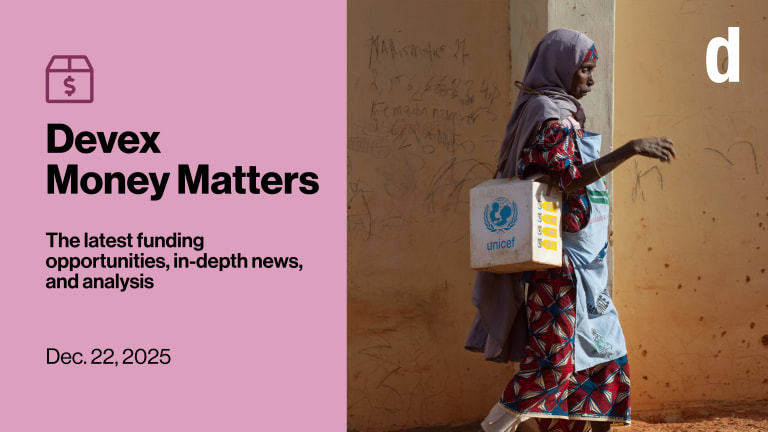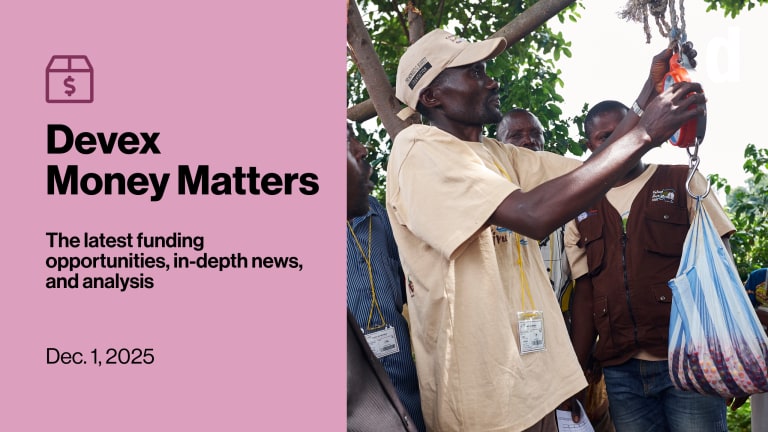
The World Bank allocated more money to projects in 2021, with a particular focus on India. Elsewhere, the African Union and the EU are discussing migration funding, and more African countries are facing debt distress.
This is a preview of Devex Money Matters
Sign up to this weekly newsletter and get the latest in development funding in your inbox every Monday.
+ Next Monday, Feb. 14, I’ll be hosting an event looking at how NGOs can develop business strategies to help them survive and thrive in the future. If you’re interested in coming along, sign up here.
Lending and spending
The World Bank has responded to the COVID-19 pandemic by getting freer with the checkbook. According to an analysis by my colleague Miguel Antonio Tamonan, it allocated over $73 billion to 554 new projects in 2021 — an increase of almost a quarter on the year before. India was by far the single biggest recipient, with almost $7 billion of projects agreed. Significant funding also went to Bangladesh, Ethiopia, and China. The biggest single project was a $1.5 billion package to support COVID-19 recovery in Brazil.
Devex Pro on the World Bank: Over $73B allocated in 2021 — where is it going?
+ With a Pro Funding subscription, track over 600,000 sources of news on global development funding. You can use it to find information on key partners, set up custom alerts, and access analysis of funding trends. Join us on Feb. 16 at 9:00 a.m. ET (3 p.m. CET) for a free workshop on how to use the platform for early stage funding intelligence.
Funding activity
AFD. $34.3M (€30M) to support the Sustainable Water Supply and Sanitation Sector Development Program in Georgia.
CABEI. $10M to support micro, small, and medium-sized enterprises in El Salvador.
EIB. $210M to support flood protection and vaccine programs in Argentina.
OFID. $35M to strengthen food security and improve health indicators in Sierra Leone.
PROPARCO. $65M to support projects in clean energy, energy efficiency, sustainable agriculture, and financial inclusion in Mexico.
WB. $400M to pursue a sustainable COVID-19 recovery in the Philippines.
22 for ’22
Featured opportunity:
$1.5B (€1.3B) from the EU for Ukraine
The European Union has agreed a major support package of $1.5 billion for Ukraine for financing needs caused by conflict with Russia. The first tranche will consist of just under $700 million, while another package is being agreed to support the country’s modernization efforts. In addition, around $150 million will be allocated in bilateral assistance for the country’s state-building and resilience efforts.
Our Editor-in-Chief Raj Kumar has worked with staff around Devex to put together a list of 22 organizations to watch in 2022. Many of these are philanthropic or state funders, and I’m particularly interested in the focus on BMZ, which is responsible for much of the funding emerging from Germany, the second largest OECD donor.
I’m also curious about Unlock Aid, a U.S.-based organization set up to challenge the status quo of large contracts, which are often difficult for subcontractors to engage with profitably.
Watch out: 22 organizations in 2022
Migration matters
My colleague Vince Chadwick has delved into the documents around a forthcoming Africa-EU summit, and found that migration is one of the top topics. An internal planning document says the European Commission will mobilize €4.35 billion ($4.9 billion) from its 2021 to 2027 foreign aid budget to address migration issues in Africa, and will also tap funds from the EU’s migration and border management budget “as appropriate.” There are also rumblings around a larger role for Frontex, the EU’s border agency.
The summit may also bring greater clarity around the Global Gateway initiative — the EU’s attempt to make greater strategic use of development funding to invest in infrastructure, and counter the narrative of China’s Belt and Road Initiative.
Devex Pro on the Battle for Africa: The latest Europe-Africa summit deliverables
+ Want a closer look at the EU’s plan for its summit with the AU? Sign up now for a Pro subscription or start your 15-day free trial.
Debt distress
Rising levels of debt are becoming a significant challenge for several African nations, Vera Songwe, the executive secretary at the U.N. Economic Commission for Africa, told the AU last week.
Across African nations, the ratio of debt to gross domestic product has risen from 40% in 2014 to nearly 70%, she said, largely driven by the cost of responding to the COVID-19 pandemic.
The number of African nations at high risk of debt distress has risen from four in 2014 to 17 today. Six countries are already in debt distress, UNECA has said.
At the AU: UN's Vera Songwe calls on African leaders to build resilience
Open Philanthropy opens wallet
Open Philanthropy, a billionaire-founded funder, is looking for other foundations with exceptional programs to give away $150 million.
Open Philanthropy announced it would support one to five “high-impact programs that improve human health, facilitate economic development, and/or address climate change” at other foundations as part of its new “Regranting Challenge.”
Open Philanthropy: Aims to award $150M in new 'Regranting Challenge'
+ Next week, on Feb. 15, we’re hosting Prescription for Progress, our annual event looking at health and development. I’m particularly interested in this year’s sessions on high-impact giving with GiveWell and on future-proofing health systems with AstraZeneca.
Sign up to Money Matters for an inside look at the biggest stories in development funding.








